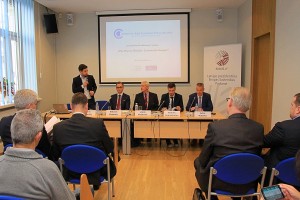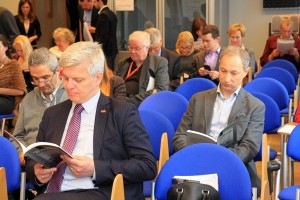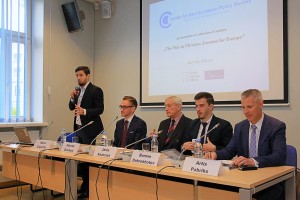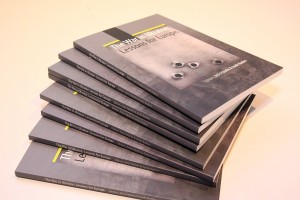
Russia’s aggression against Ukraine has forced the European Union to reconsider its policy in relations with Russia and its neighbouring countries. Political, economic and security problems, faced by the EU Member States due to Russia’ aggression, cannot be managed by each country separately. While participating in the presentation of the collection of articles “The War in Ukraine: Lessons for Europe”, publicized by the Centre for East European Policy Studies (CEEPS), and sharing their opinions on what practical changes should be introduced in the EU security and economic policy after the annexation of Crimea, researchers stressed that solutions to the above mentioned would have to be looked for at regional and all-European level.
New security challenges reveal necessity for a closer cooperation between the EU and NATO, for neither NATO, nor EU alone can oppose effectively the hybrid threats. The authors of the collection of articles indicate that both still closer regional cooperation and strengthening each Baltic state’s self-defence capacity are necessary for consolidating the Baltic countries’ security.

The researchers emphasize that promotion of society’s unity has become the security issue in hybrid threat prevention. In the context of invigorating the Baltic media, the experts call to introduce changes in the EU media sphere regulations, thereby securing for the Baltic countries a possibility of monitoring and maintaining control of the Russian media activities in the Baltics.
According to Roman Dobrokhotov, editor of the Internet analytical journal The Insider from Russia and one of the authors of the new collection of articles, the Western sanctions have already had their consequences on Russian economics. In case this tendency continues, Russian political elite will be forced to react to economic problems with more certainty.
Ukrainian researchers conclude that Russia will go on with the use of energy issues as the instrument of manipulation until the EU creates a systemic solution to the common energy policy.

Jānis Kažociņš, security expert and one of the authors of the book, indicates that over the period of many years, Russia has been insisting that the West is responsible for the Ukraine events, but that is not true. Russia continues to use its compatriots abroad for realizing its own interests, although in reality Russia does not care for their needs.
It was mentioned also that Russia’s aggression against Ukraine has considerably influenced the political atmosphere in Eastern Partnership countries, thereby, in order the EU Neighbourhood Policy activities maintain their effectiveness, the bureaucratic approach has to be replaced by a more strategic and flexible conduct.
Andis Kudors, Executive director of the CEEPS and co-editor of the collection of articles, stresses that, although the war in Ukraine is not war in the European Union, it is nevertheless the war in Europe, and the Union should act with more certainty, in line with its moral, political and economic weight.

According to the researchers, although at celebration of the 70th anniversary of Yalta Conference, Russia representatives were speaking about necessity of a similar event in order “the major players have a possibility to discuss new rules of the game”, nevertheless Europe should not comply with Russia’s demand to establish zones of exclusive interests. The already existing international norms and principles which are mandatory for everybody, including Russia, are the only criteria for what is acceptable or inacceptable in international relations.
The collection of articles “The War in Ukraine: Lessons for Europe” has been divided in three thematic parts dealing with challenges to European security, economics and politics. The researchers offer solutions to the further EU – Russia relationship. Considerable attention is paid to the new security challenges that have appeared after the beginning of Russia’s aggression against Ukraine.

The chapter on security issues considers hybrid war threats to the Baltics, and the necessary steps for strengthening the EU’s common security and defence capacity have been outlined. The chapter, dedicated to economic questions, presents analysis of the impact of Western sanctions on Russian economics, and the importance of energy issues in the Russia – Ukraine conflict. In its turn, the chapter on political matters comprises analysis of the future prospects of the political relations among EU, Russia and Ukraine.
The group of authors of the book includes researchers from Latvia, Finland, the United Kingdom, Ukraine and Russia. It has been created with financial support on the part of European People’s Party (EPP) Group at the European Parliament and Konrad Adenauer Foundation.
Electronic version of the collection of articles is available here.
